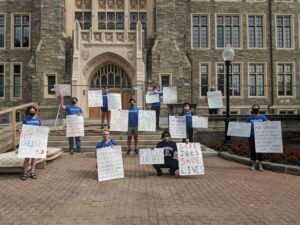Many students were able to pack up their rooms this spring. Some still don’t know where the belongings they left behind are.
When students left campus this spring due to the COVID-19 pandemic, approximately 550 of them were unable to return to Georgetown to move out. Those students relied on Georgetown-provided packing and storage until they could return to campus again. Now, some of these students face high costs to regain their items, or worse, have lost their things for good.
While some students have not been able to access their belongings due to high costs from the university’s storage partner, others have run into problems with The Corp, an on-campus student organization that, in addition to coffee shops, offers student storage services. Others reported items were disposed of from students’ rooms during their absence by university employees.
One student who wished to remain anonymous, and will be called Gaby, explained that she was unable to return to campus this spring due to concerns about bringing the COVID-19 virus back to her family, some of whom have severe underlying conditions. Despite phone conversations with university staff members who assured her keeping her belongings at school would result in no extra costs, she now finds herself with an $865 charge to have her items shipped to her residence.
In Gaby’s view, the university is not being considerate of students’ changing circumstances during the pandemic.
“Of course, there was no way for them to know that we wouldn’t be back in the fall, no one had reason to believe this virus wouldn’t clear up,” Gaby said. “But, the fact that they have not given a free or even affordable option for students who are simply not ever coming back to campus is absurd.”
When the university first announced a shift to virtual learning this spring, students unable to move out by March 22 had their belongings packed and stored for free by a company Georgetown partnered with, Hilldrup.
Following the announcement of the fall virtual semester, the university gave all students whose items remained on campus the options of keeping their things in storage until the spring, donating all their belongings, picking them up at the beginning of the semester, or paying to have it shipped to them.
As a student graduating this December, Gaby feels the time crunch to regain her belongings but is still concerned with the cost of returning to campus to pick up her items as well as putting family members at risk.
While Gaby has contacted Residential Living, The Office of Student Affairs, and Georgetown Auxiliary Business Services to request a subsidy, she has been denied any help to offset the cost of shipping. Now, Gaby said she regrets trusting the university in the first place.
“I begged them for help as this is a very high cost for me,” she said. “I find it absolutely ridiculous that a billion-dollar institution cannot give a student at least a subsidy to help with something that is totally a failure on their part.”
Not only have students struggled to regain their items stored through Hilldrup, but some students, specifically from Isaac Hawkins Hall, have received emails from the university informing them some or all of their items had been thrown away.
According to GUSA representatives in a press conference, while only a few students were impacted, it involved the significant loss of many or all of their personal belongings. Georgetown’s Office of Risk Management is dealing with incidents of lost items on a case by case basis, and offering university insurance to cover the costs of disposed belongings.
According to a university spokesperson, storage staff asked students to identify items of sentimental value or that needed special protection.
“For any items that were accidentally disposed of during the packing and storage process, the university has been working with students as quickly as possible to reimburse them,” the spokesperson wrote in an email to the Voice. “For students who have lost items, we are sorry for the impact this has caused and will continue addressing the matter with our staff and reviewing procedures.”
Students who did not opt for university storage but relied on The Corp are still facing barriers to accessing their items in an affordable and secure manner.
Leina Hsu (COL ’22) stored her items with The Corp over the summer, expecting to be back on campus this fall. When the university announced the extension of virtual learning to the fall, Hsu was told she could pick up her items on Aug. 14, even though her move out date from her on-campus housing was earlier in the month. To get her belongings, Hsu would have to make additional trips to D.C. from her New York residence.
Though she could pick up her belongings at an alternate date she would be charged a $250 access fee to enter the storage facility. Hsu worries that the access fee to pick up items, or the cost of having to rebuy belongings, will prove a heavy burden on students.
“This obviously affects lower-income students so much more,” she said. “For example, I stored all of my winter jackets inside storage. So that would mean like if I can’t get the box on time, I have to rebuy all my winter jackets, which can be extremely expensive.”
Hsu’s concerns about Corp Storage’s costs to the student body are not new. In the past, practices by The Corp have resulted in heavy financial losses for students. Amidst the financial challenges caused by COVID-19, in which the many students are ineligible for stimulus checks, additional costs pose a heavy burden.
In 2018, Mariona Franklin (NHS ’21) stored items with The Corp during a leave from campus. Following instructions, Franklin dropped off her boxes in a storage area on campus, told that her items would be quickly picked up and moved to a secure location for storage. Months later, she received an email that her items had never been removed from the temporary space by The Corp employees, and as a result, many of her belongings along with the things of approximately 15 other students had been stolen or wrecked beyond repair.
For Franklin, the loss of both personal items and academic tools was a devastating loss. While she was offered $400 in reimbursement for her lost items, the cost of Franklin’s items far outweighed their offered payment.
“I’m a nursing student. So that’s my books and nursing equipment like my stethoscope and my special nursing shoes and my uniform,” she said. “Actually, I think you guys need to pay me for all the possessions I have lost because of this, not just $400.”
Franklin threatened to take The Corp to small claims court in order to get proper reimbursement for her items, which she estimated to be worth around $2,000. While Franklin’s willingness to take The Corp to court resulted in greater reimbursement, she worries that many of the other students impacted might not have known they had other options and accepted the $400 at a loss.
Franklin does not believe that students should be punished for putting trust in people who promise to care for their belongings well.
“We entrusted you to store my items safely and securely. You broke that promise, and that is on you,” she said.
Disclaimer: Leina Hsu is a contributing editor for The Voice







